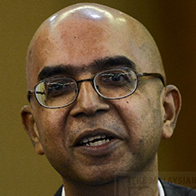The two people entrusted with the future of Malaysia are former head honchos of multi-billion ringgit government-linked corporations (GLC).
Datuk Seri Wahid Omar was CEO of Maybank before he became head honcho of the Economic Planning Unit (EPU).
Datuk Seri Idris Jala was the CEO of Malaysia Airlines (MAS) before he became head honcho of Pemandu, the “other” EPU. Prior to MAS, he was a senior corporate executive at Shell.
Both Wahid and Idris have good business pedigrees. They succeeded in moving organisations from perceived roads to failure to roads to success.
Those who haven’t worked at senior levels in industry often miss an important aspect about how big businesses succeed: they work hand-in-glove with the government to create policies favourable to themselves. This is called lobbying.
The need for lobbying is encapsulated in this adage: “If you’re not at the table, you’ll end up as food on the table.”
Lobbying the government is considered an unsavoury practice in most parts of the world except the US, where I’ve even been given business cards with the designation “lobbyist”.
Nevertheless, in the US as in other nations, corporations and governments hide lobbying behind curtains of obscurity. (This is also true of international treaties: the TPPA is very, very secret.)
Corporations make employees sign confidentiality agreements.
In Malaysia, the government hides behind the Official Secrets Act and the Banking and Financial Services Act which give the lie to the Whistle-blower Act – recall the persecution of Malaysia’s best-known whistle-blower, Rafizi Ramli.
Idris and Wahid will have much experience of lobbying the government, seeking laws, policies and incentives which would increase the profits of their companies. Now they are on the other side.
As CEOs, Idris and Wahid have probably insisted brazenly that high taxation of petroleum extraction, refining and distribution is a bad idea; that government subsidies for alternative energy are a bad idea; that deregulation in the airline industry is a bad idea; that empowering unions is a bad idea; that more transparency in banking is a bad idea; that setting government-defined constraints on loans is a bad idea, etc.
How likely are they to see things from the other side? Can Parliament hold them accountable?
The majority of our members of parliament (MP) are puppets who don’t do a shred of real parliamentary work. They depend upon members of the opposition to read and explain – during short-burst “debates” in Parliament – important knowledge about any matter to be legislated.
The majority of our MP’s don’t have the competence to be members of select committees which, in developed nations, prepare White Papers which describe and evaluate alternative options before selecting and offering a recommended path to Parliament.
The majority of our MPs just want to be appointed to the boards of GLCs where they can draw large incomes for showing up at meetings – perish the thought of actually critiquing alternative strategies, conducting ethics investigations or chairing audit boards!
Why discuss GLCs?
1MDB and MAS are current examples of how national wealth can be squandered. 1MDB is not a GLC, but a certain manic leader may like it if 1MDB was made a GLC (or “sold” to Khazanah, like MAS) and one of his sons and his cronies replace Jho Low and his cronies. GLCs are a gaping wound in our nation.
In 2013, the Asian Development Bank (ADB) issued a report titled with the question “Are GLCs crowding out private investment in Malaysia?”
After extensive research, the authors answered: “when GLCs are dominant in an industry, investment by private firms is significantly negatively impacted... To revive private investment... government must not only redress its growing fiscal deficit, but also expedite its programme of divestment.”
Yes, the researchers said “significantly.” Their research also showed:
-
Foreigners shun Malaysia; even domestic investors are fleeing (Tabung Haji is buying property in London and YTL has invested heavily in the UK);
-
Spiting the Economic Transformation Program’s call for divestment, GLCs diversified: their purchases included private finance companies and property developers;
-
Twenty-four GLCs were supposed to be divested between 2011 and 2012. By February 2013, only 15 GLCs had been divested;
-
GLC’s account for 54% of the market capitalisation of the KLCI;
-
The preferential treatment accorded GLCs suggests the superior performance of some GLCs is artificially generated and comes at the cost of crowding out private investors.
-
Recognising the tragedy of GLCs, the government launched a 10-year transformation programme in May 2004, to be driven by the Putrajaya Committee on GLC High Performance (PCG). “The program is expected to produce regional champions and place GLCs at par with its competitors by 2015.”
What will the former CEOs of GLCs say about GLCs in the 11th Malaysia Plan (11MP)? – May 14, 2015.
* This is the personal opinion of the writer or publication and does not necessarily represent the views of The Malaysian Insider.


Comments
Please refrain from nicknames or comments of a racist, sexist, personal, vulgar or derogatory nature, or you may risk being blocked from commenting in our website. We encourage commenters to use their real names as their username. As comments are moderated, they may not appear immediately or even on the same day you posted them. We also reserve the right to delete off-topic comments